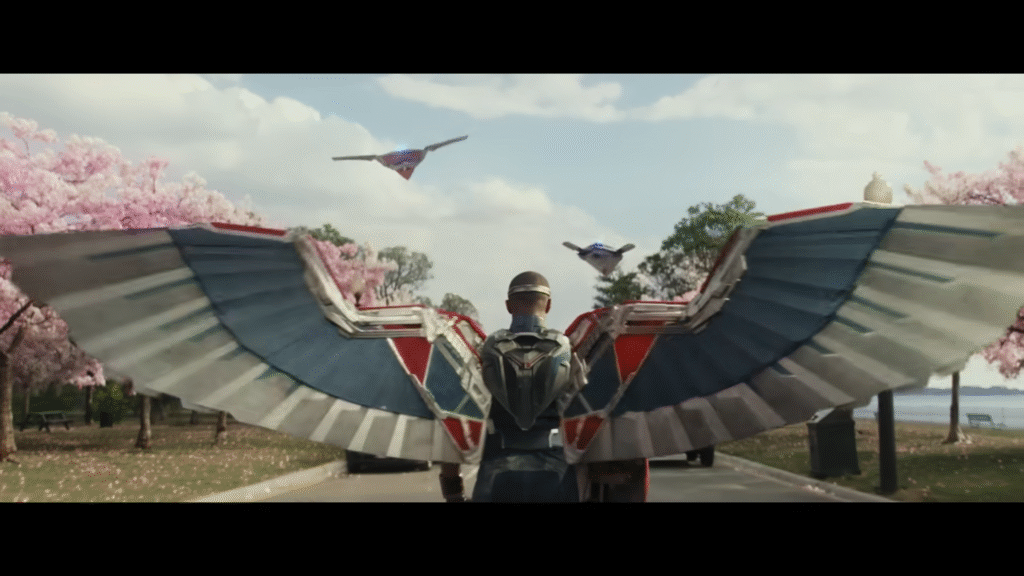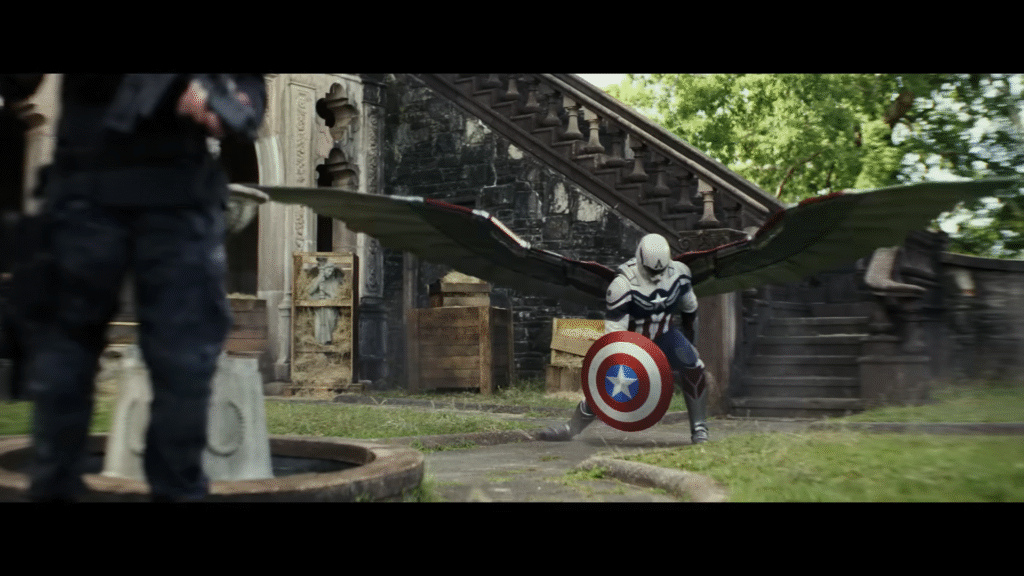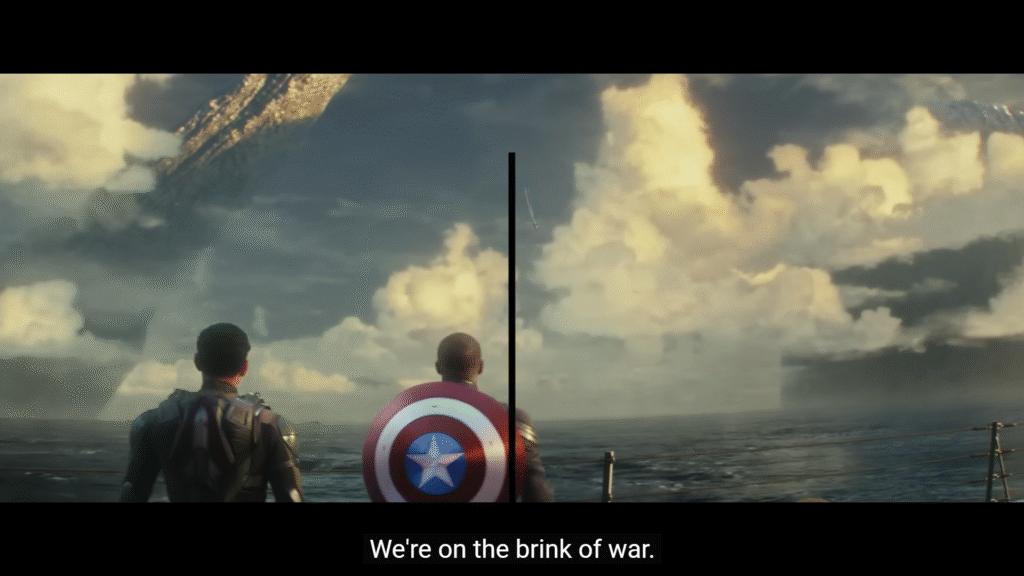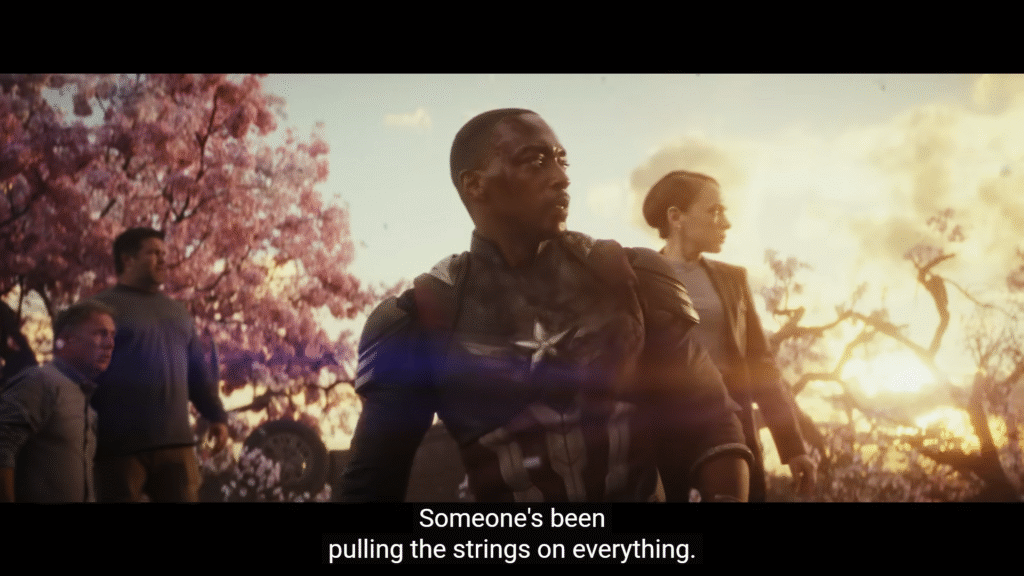Captain America: Brave New World
Introduction
Captain America has always been more than just a character in the Marvel universe. He’s a symbol, a question, and at times a mirror for how society views itself. When Captain America: Brave New World was announced, fans felt the weight of expectation. Not only because Steve Rogers left behind a legacy of sacrifice and resilience, but because Sam Wilson—the Falcon who became the new Captain America—is now carrying the shield into a fractured world.
I’ve always felt Captain America stories hit harder than most superhero tales. They aren’t just about costumes and villains; they’re about what happens when ideals clash with reality. Growing up, my father loved to tell me about his time in the military and how the hardest battles weren’t fought with weapons, but with values. That personal backdrop makes me appreciate how Marvel uses Captain America to explore not just what America is, but what it could be.
With Brave New World, Marvel is setting up a film that doesn’t just entertain—it challenges. Let’s dive into everything we know about the story, the characters, the production, and why this film matters.

The Evolution of Captain America
Before we get into the new film, it’s important to step back and see how Captain America evolved over the decades. Created in 1941, Captain America was originally propaganda—an icon to rally Americans during World War II. Steve Rogers was the everyman turned soldier, punching Nazis on comic covers before the U.S. officially entered the war.
But as time passed, the character became something deeper. In the 70s, he questioned government corruption. In the 2000s, he fought against security overreach in Civil War. The films followed that trajectory. Chris Evans embodied the steadfast, morally unshakable Steve Rogers, but Marvel wisely recognized the world was changing. The symbol had to evolve too.
Sam Wilson’s transition into Captain America represents that evolution. He’s not a super soldier, he doesn’t have serum in his veins, and his power doesn’t come from enhanced genetics. His strength comes from empathy, resilience, and his ability to lead. That alone makes Brave New World feel urgent and refreshing.
Plot Overview: What We Know So Far
Marvel has been tight-lipped about the full storyline, but details have slipped out through casting announcements and set leaks. At its core, Captain America: Brave New World will explore Sam Wilson establishing himself as the new Captain America while facing global instability.
The movie is rumored to feature themes of political unrest, international power struggles, and the fragile state of leadership in a divided world. The title “Brave New World” isn’t just catchy—it suggests a society that’s stepping into unfamiliar, possibly dangerous territory. Think of it as a continuation of the questions raised in The Falcon and the Winter Soldier: what does it mean to inherit a symbol that doesn’t always reflect the reality of the world it claims to represent?

Key Cast and Characters
Sam Wilson (Anthony Mackie)
Anthony Mackie has played Sam Wilson since Captain America: The Winter Soldier. His performance always brought humanity to a character who could have been overshadowed by flashier Avengers. In Brave New World, Mackie finally takes full ownership of the Captain America mantle. This isn’t Steve’s shield anymore—it’s Sam’s.
Thunderbolt Ross (Harrison Ford)
One of the biggest casting announcements was Harrison Ford stepping in as Thunderbolt Ross after the passing of William Hurt. In this film, Ross is now the President of the United States, and his relationship with Captain America is bound to be tense. Ross has never been comfortable with unchecked heroes, and now he’s leading the country.
The Leader (Tim Blake Nelson)
Fans of The Incredible Hulk (2008) remember Samuel Sterns, who was last seen exposed to gamma radiation. Now, he’s finally back as the Leader, a brilliant but twisted villain with powers rooted in intellect. His return not only ties back to early MCU history but adds a formidable opponent for Cap.
Supporting Cast
The film also brings back Joaquín Torres (Danny Ramirez), who may step up as the new Falcon. There’s also Isaiah Bradley (Carl Lumbly), whose story of being a forgotten super soldier already left a huge emotional mark in The Falcon and the Winter Soldier.
Themes of the Film
What makes a Captain America story memorable isn’t just the action—it’s the questions it raises. Brave New World looks poised to dig into:
Identity and Legacy – Can Sam Wilson live up to the shield’s legacy while redefining it on his own terms?
Power and Politics – With Ross as President and the Leader returning, the film will explore how governments and superpowered individuals clash.
Race and Representation – Let’s be honest: having a Black Captain America isn’t just comic-book canon, it’s cultural commentary. Marvel touched on it in The Falcon and the Winter Soldier, but this film has the chance to push it further.
I remember when I first saw Sam Wilson hand that shield back to the Smithsonian at the start of Falcon and the Winter Soldier. It struck me how much that moment mirrored real life—how many people feel unworthy of carrying history because they weren’t “the right face” for it. Seeing him now fully embrace the shield is more than a character arc—it’s representation that matters.

The Director’s Vision
The film is directed by Julius Onah, best known for The Cloverfield Paradox and Luce. Onah has a knack for weaving political and social themes into gripping narratives. His presence signals that this won’t just be another Marvel spectacle. It will have teeth.
Marvel films often walk a tightrope between blockbuster action and deeper meaning. With Onah at the helm, Brave New World could join the ranks of The Winter Soldier as one of the MCU’s most politically charged stories.
Action and Tone
Fans can expect plenty of action, but don’t expect the kind of super soldier brawls we saw with Steve Rogers. Sam Wilson fights differently. His wings and tactical smarts make his battles more aerial, more creative. He wins through strategy, not brute strength.
The tone is expected to be serious, with less of the MCU’s trademark humor dominating. That doesn’t mean it’ll be bleak. Instead, it will be grounded, echoing the espionage thriller feel of The Winter Soldier with the emotional core of Falcon and the Winter Soldier.
Marvel’s Strategy with Captain America
Marvel knows Captain America is one of its crown jewels. With the Avengers lineup shifting after Endgame, having Sam Wilson at the center helps ground the MCU in themes audiences care about.
The choice to focus on political intrigue and societal struggles, rather than cosmic threats, shows Marvel is trying to keep Captain America films distinct. If Brave New World succeeds, it will prove Marvel can still make character-driven stories in a universe often dominated by spectacle.
Personal Take: Why This Film Matters
I’ll be honest: when Steve Rogers passed the shield to Sam at the end of Endgame, it felt right but also risky. Would audiences accept it? Would Marvel commit to making it meaningful rather than symbolic? Watching Sam’s journey in Falcon and the Winter Soldier was personal for me. My younger brother once told me how he struggled with leadership in his job, always feeling like he wasn’t “the chosen one” but just someone filling in. Seeing Sam wrestle with that same doubt made the character deeply relatable.
That’s why Brave New World matters. It’s not just about who throws the shield. It’s about what it means to lead when you weren’t the obvious choice.
Anticipated Impact on the MCU
This film is more than a solo adventure—it sets the stage for the next Avengers lineup. Sam Wilson’s Captain America will likely become the moral compass of the team, much like Steve once was. With villains like the Leader reentering the picture, Marvel is planting seeds for storylines that connect to Hulk, Thunderbolts, and possibly the Young Avengers.

Conclusion
Captain America: Brave New World isn’t just another Marvel film. It’s a statement about legacy, identity, and leadership in uncertain times. Sam Wilson’s journey to fully becoming Captain America will resonate not only with comic fans but with anyone who has ever felt the weight of expectation.
Marvel has the chance to deliver a film that stands alongside The Winter Soldier as a benchmark for what superhero movies can be: action-packed, thoughtful, and emotionally resonant.
FAQs
1. Who is playing Captain America in Brave New World?
Anthony Mackie returns as Sam Wilson, taking full ownership of the Captain America mantle.
2. Is Steve Rogers coming back?
There’s no official confirmation. Chris Evans has hinted his story is finished, so don’t expect him to return as a central character.
3. Who is the villain in the film?
Tim Blake Nelson returns as the Leader, first introduced in The Incredible Hulk (2008).
4. Will this film connect to Thunderbolts?
Yes. With Harrison Ford as President Ross, there’s a strong chance this story ties directly into the upcoming Thunderbolts film.
5. When is the release date?
The film is currently set to release in 2025, though Marvel’s schedule is always subject to change.
